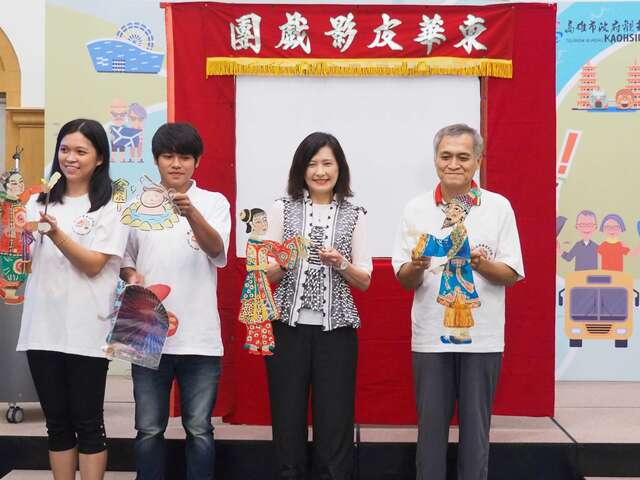Donghua Shadow Puppet Theatre Introduction
Donghua Shadow Play Troupe has a history of two hundred years, originally named "Dexing Ban." It is the most famous local cultural asset of the former Dazhi Township. The fifth-generation inheritor, Zhang Decheng (deceased), was elected as one of the first national folk art masters along with Li Tianlu in 1989, enjoying the honor of a national treasure. The elder generation in the Dazhi community is well aware of "Puppet Zhang" Zhang Cuo, which has been passed down from "Puppet Chuanzi" Zhang Chuan, then to Zhang Jiao and Zhang Decheng; the artistic talents of the Zhang family have been highly recognized. In the era before television, shadow play was the most popular form of folk entertainment; adults and children would gather to watch shadow plays, listen to folk legends, and enjoy the unique light and sound of shadow puppetry. Under the promotion of Zhang Decheng, the Donghua Shadow Play Troupe toured all over Taiwan in the 1940s, causing a sensation and even performing in the United States, the Philippines, Hong Kong, South Korea, Japan, and other places, contributing greatly to national diplomacy. Zhang Decheng passed away in 1995, and his third son, Zhang Zuo Guo, continues his father's legacy of "passing on history through art." In recent years, they have collaborated with local cultural centers to promote the cultural heritage of shadow play. Shadow puppetry and its transmission: Over two thousand years ago, Emperor Wu of Han mourned the death of his beloved concubine and ordered a Taoist priest to summon her spirit using sorcery. The Taoist priest set up a large curtain in the palace, using smoke and dim lighting to project shadows on the cloth, claiming that the spirits had appeared, which comforted Emperor Wu. Accompanied by this beautiful legend, shadow play has been passed down in China to this day. Chinese shadow play is one of the earliest forms of performance art that employs the "light" and "shadow" effects, combining rich imaginative motifs with painting, carving, music, and drama. By the late Northern Song Dynasty, this form of performance had matured. Shadow plays remained popular among the people during the Song, Ming, and Qing Dynasties. Shadow puppetry is a flat art form, where the design of each puppet often presents a combination of many sculptural techniques in perspective. Under the puppeteer's manipulation, along with singing, dialogue, and drum music, the performance intricately transforms within the two-dimensional space, creating a seemingly real yet illusory world of puppets. The Donghua Shadow Play Troupe is a family legacy and the oldest shadow play troupe in Taiwan. What sets them apart is their ability to adapt; they do not just limit themselves to performing ancient traditional techniques but also make various improvements, such as enlarging the shadow screen, increasing the puppet sizes, using more vivid colors, ensuring the joints are flexible, and employing high-difficulty techniques and special lighting effects to create unique visual experiences. Aside from being renowned in the southern region, from the 1940s to the 1950s, the troupe was the only one in the shadow play industry that could draw crowds at theaters across the province. They received invitations to perform in Japan, the Philippines, Hong Kong, the United States, and other places. Due to the significant contributions of the fifth-generation leader, Zhang Decheng, he was awarded the first Folk Art Transmission Award in 1985 and became the first national folk art master in 1989. Currently, the sixth-generation leaders, Zhang Zuo Guo and Zhang Yi Guo, have taken over the leading role since 1987 and work diligently on the preservation and promotion of Taiwanese shadow puppetry. In addition to maintaining tradition, they also add creativity, earning widespread acclaim for their dynamic, rhythmic performances. They have received the Outstanding Art Transmission Golden Lion Award, the National Top Ten Outstanding Youth Transmission Award, and have produced the first graduate of shadow puppetry under the Ministry of Education's important folk art program.






























